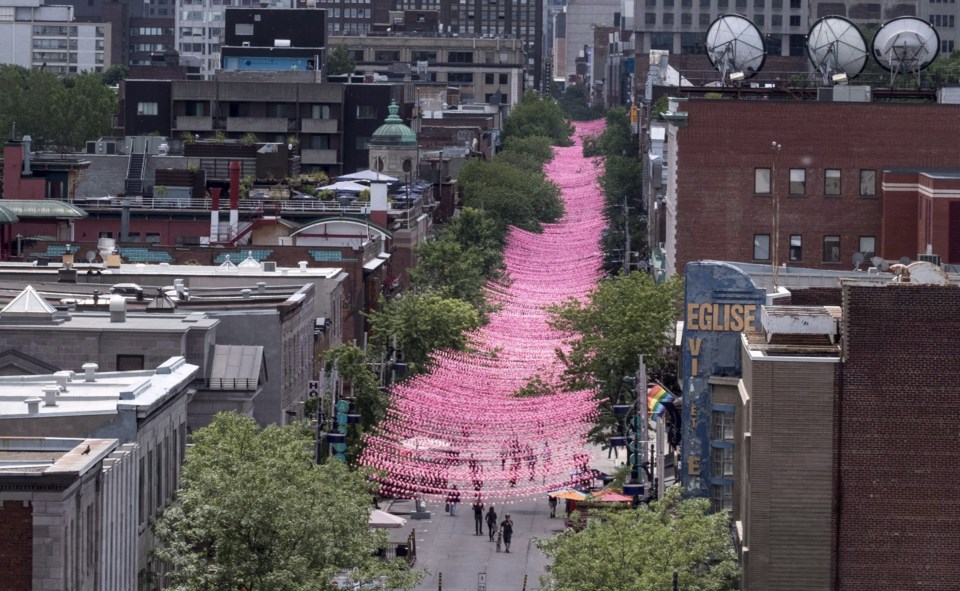MONTREAL — Claude Cormier, a celebrated Canadian landscape architect who helped design some of Montreal and Toronto's best-known public spaces, has died at 63.
His firm, Claude Cormier + Associ√©s, said Cormier died Friday in Montreal following complications from Li-Fraumeni Syndrome, a rare genetic condition that predisposes carriers to multiple cancers. ¬Ý
An obituary on the firm's website says Cormier was the creative force behind some of Canada’s most "beloved, joyous and critically acclaimed" public spaces, including Toronto's Berczy Park with its famous dog fountain, and the canopy of pink — and later multicoloured — plastic balls that hung for years in rows above Montreal's Village district.
"Cormier’s joyful and subversive designs blended conceptual clarity with a studied instinct for making enduring places," the obituary says.
"His ability to design public spaces with broad public appeal stemmed from multiple qualities: audacity, sincerity, discipline, leadership, business acumen, a talent for creative problem solving, and an ability to bring light and laughter to everyone — and every situation — he encountered."
His work ranged from high-traffic plazas, such as Montreal's Place d’Youville and Dorchester Square, to the brightly coloured umbrellas of Montreal's Clock Tower Beach and Toronto's Sugar Beach.
Cormier also collaborated on the design of Ottawa's National Holocaust Monument, inaugurated in 2017.
His final big projects were a 30-metre suspended steel hoop in downtown Montreal dubbed "The Ring," and Toronto's heart-shaped Love Park ‚Äî both of which are described in the obituary as love letters to Cormier's favourite cities.¬Ý
Montreal Mayor Valérie Plante paid tribute to Cormier on social media, describing him as a "visionary, a builder and a great Montrealer."
"His influence on the city's symbols and public spaces can be counted in the dozens: the Ring, the Village balls, Dorchester Square, Clock Beach and more," she wrote on X, formerly known as Twitter.
"His architectural work is a legacy that will remain in our memories forever."
The obituary says Cormier was born in the small town of Princeville, Que. He originally studied agronomy in university in order to take over the family farm, but later switched to landscape architecture, earning a bachelor's degree at the University of Toronto.¬Ý
He studied at Harvard University Graduate School of Design, where he obtained a master’s degree in the history and theory of design.
The obituary says Cormier embraced a role as an ambassador for queer issues in his work, with a "characteristic blend of avant-garde techniques and accessible fun (that) create places that emotionally resonate with — and beyond — LGBTQ2S+ clients and communities."
Those projects include Lipstick Forest — composed of 52 hot pink concrete tree trunks in Montreal's main convention centre — as well as the seasonal plastic ball project over the city's Ste-Catherine Street, the final iteration of which was titled 18 Shades of Gay and evoked the rainbow LGBTQ flag.
But while his art was playful, Cormier struggled with a genetic mutation that had caused several members of his family on his father's side to die young from cancer. According to the obituary, Cormier continued to work with medical researchers to better understand the condition after he was diagnosed with lung cancer, kidney cancer, and a rare form of lymphoma four years ago.
The obituary says he is survived by his mother, sister, brother, nieces and nephew, as well as many colleagues and friends.¬Ý
This report by The Canadian Press was first published Sept. 15, 2023.
Morgan Lowrie, The Canadian Press



